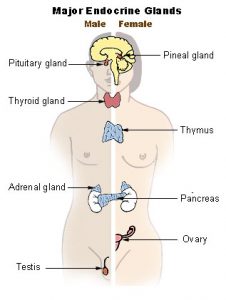Endocrine Glands Definition
Endocrine glands are tissue or entire organs that excrete chemical substances (or hormones) directly into the blood rather than through a system of ducts. These two methods of transport mark the difference between exocrine and endocrine glands. While in the bloodstream, the hormones will be able travel through the body’s circulatory system to reach distant targets. Hormones, in turn, will carry out varied functions in the body depending on the receptors they bind and the quantity of hormone that is present. These voluble changes will reflect the balance of secretion and excretion of hormones in the body. Their duration will depend on the hormone’s inherent half-life and activity levels.
The actual release of hormones will be tempered by our nervous system. Hormone release will be directly tied to the body’s response to certain neural or hormonal stimuli. Hormones come in various forms; some may present as fatty steroids or long chained amino acids. These substances will travel through our blood stream to reach specific tissues or organs. The endocrine system will regulate our metabolic processes, our appetite, our growth, and even our sleeping patterns. Our endocrine glands will essentially help regulate our body’s energy distribution in order to wire all of these varied processes. Many tissues in our bodies have the ability to release chemical substances into our blood, but we will discuss the most major endocrine glands in more detail.
List of Endocrine Glands

The figure depicts the major endocrine glands of the human body.
Among the most important endocrine glands in the human body is the hypothalamus. In spite of its small size, this part of the brain releases crucial chemicals that influence the body’s internal homeostasis as well as the pituitary gland. Its hormones include oxytocin and growth hormone, among many others. The pituitary gland, in turn, is another endocrine tissue that releases hormones related to growth, mental development, and sexual reproduction. Moving on the pineal gland in the brain, the pineal body will create and release various hormones, including melatonin, which regulates our sleep and waking cycles and eventual sexual maturation. The thyroid is an endocrine gland in the neck that releases thyroid hormones that help maintain our body’s metabolic and energetic processes. The parathyroid gland, on the other hand, lies behind the thyroid gland and secretes chemicals that allow for normal bone development. The thymus has much more important roles in immune health during our childhood (via T cell production), as it is eventually phased out by fat in post pubescent children. The pancreas is another endocrine gland that will release insulin in the body, which importantly allows for sugar in the blood to be metabolized. Moving southward to the kidneys, the adrenal glands that lie above each will secrete adrenaline hormone during strenuous fight or flight situations. This modulation will likewise influence the way our bodies uses energy. Lastly, our sex organs are considered a major type of endocrine gland. Ovaries in women will create estrogen and progesterone derivatives that help with our sexual development and will aid in the release of eggs for future fertilization. Thus, all of these glands orchestrate large processes that keep our species alive and thriving. Hence, the evolutionary importance of having endocrine tissue!
Major Endocrine Glands:
- Hypothalamus
- Thyroid
- Parathyroid
- Pituitary gland
- Adrenal glands
- Pineal gland
- Pancreas
Function of Endocrine Glands
The endocrine system derives its power from coordinating the interactions that take place between the hormones that are released by this network of glands. Endocrine glands themselves will inherently be able to make, secrete, and store hormones for future use. This ability to store hormones for later release is useful for modulating a response to a certain stimulus. Depending on our developmental needs at whichever stage in life we are in, our endocrine system will ensure that a proper hormonal balance is in place so that we release more or less of certain hormone based on these needs. Many factors can compromise this balance, however, resulting in endocrine disease.
One such instance is when too much or too little hormone is released from a given endocrine gland. Another problematic scenario is if an afflicted patient’s blood supply is not strong enough to carry the hormones the distance they need to be carried to reach their target organs. Therefore, a vital process mediated by the endocrine system is compromised, if not many. Furthermore, once the hormones reach their target site, the tissue must have an adequate number of hormone receptors to maintain this intricate balance. The targets that receive the hormone must also be able to respond as they should to the signal. For instance, when TSH made by the pituitary gland travels through the blood to get to the thyroid, the thyroid must be able to respond by making enough thyroid hormone.
Quiz
1. Which of the following is not an endocrine gland property?
A. Production of hormones
B. Regulate wake and sleep processes
C. Expel primarily to local receptors
D. Secrete to blood
2. Which of the following is not an endocrine gland?
A. Adrenal glands
B. Salivary glands
C. Pineal glands
D. Pancreas
3. Which is not a complication of the endocrine system, as posed by the article?
A. Too little hormone is expelled
B. The patient does not have adequate blood flow to allow adequate passage of substances
C. The incorrect hormone is transmitted through a target tissue
D. Not enough hormone receptors are present
References
- Hormone Health Network (2017). “The Endocrine System.” Hormone. Retrieved on 2017-08-11 from http://www.hormone.org/hormones-and-health/the-endocrine-system
- Teens Health (2017). “Endocrine System: Body Basics.” Kids Health Org. Retrieved on 2017-08-10 from http://kidshealth.org/en/teens/endocrine.html
- Sargis, Robert MD. “About the Endocrine System.” Endocrine Web. Retrieved on 2017-08-13 from https://www.endocrineweb.com/endocrinology/about-endocrine-system
Endocrine Glands
No comments:
Post a Comment